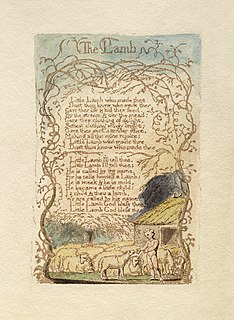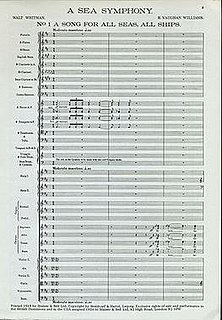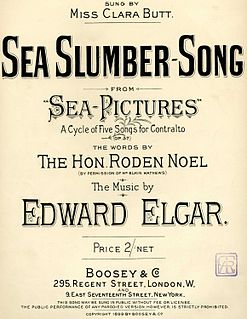Related Research Articles

"Rule, Britannia!" is a British patriotic song, originating from the 1740 poem "Rule, Britannia" by James Thomson and set to music by Thomas Arne in the same year. It is most strongly associated with the Royal Navy, but is also used by the British Army.
Sea Pictures, Op. 37 is a song cycle by Sir Edward Elgar consisting of five songs written by various poets. It was set for contralto and orchestra, though a distinct version for piano was often performed by Elgar. Many mezzo-sopranos have sung the piece.
John Mitchell is an American classical composer. He is the son of John Stewart Mitchell, pianist and cousin of Canadian novelist W. O. Mitchell and Hungarian-born singer Teresa Hideg Mitchell. He studied music composition at the University of California, Los Angeles, with Dr. John Vincent, who succeeded Arnold Schoenberg as professor of composition there. In 1965 Mitchell left UCLA, but he and Dr. Vincent remained close friends until Vincent's death in 1977.

"The Lamb" is a poem by William Blake, published in Songs of Innocence in 1789.

A Sea Symphony is a composition for orchestra and chorus by Ralph Vaughan Williams, written between 1903 and 1909. Vaughan Williams's first and longest symphony, it was first performed at the Leeds Festival in 1910, with the composer conducting. The symphony's maturity belies the composer's relative youth when it was written. One of the first symphonies in which a choir is used throughout the work and is an integral part of the musical texture, A Sea Symphony helped set the stage for a new era of symphonic and choral music in Britain during the first half of the 20th century. The work is sometimes referred to as the Symphony No. 1.

A Ceremony of Carols,Op. 28, is an extended choral composition for Christmas by Benjamin Britten. scored for three-part treble chorus, solo voices, and harp. The text, structured in eleven movements, is taken from The English Galaxy of Shorter Poems, edited by Gerald Bullett. It is principally in Middle English, with some Latin and Early Modern English. It was composed in 1942 on Britten's sea voyage from the United States to England.

"Sea Slumber Song" is a 19th-century poem by Roden Noel set to music by Sir Edward Elgar as the first song in his song-cycle Sea Pictures (1899).
"Sabbath Morning at Sea" is a poem by Elizabeth Barrett Browning first published in 1839, which Sir Edward Elgar set to music in 1899 as the third song in his song-cycle Sea Pictures.
Oh, soft was the song is a song with words by Gilbert Parker set to music by the English composer Edward Elgar in 1910, as his Op. 59, No. 3. It is the second and last verse of a poem At Sea which Parker published in Volume I of a series of poems called Embers. The Opus 59 songs were part of a song-cycle of six romantic songs by Parker that was never completed – Nos 1, 2 and 4 were never composed. The other songs were Was it some Golden Star? and Twilight. The songs were originally written with piano accompaniment, but this was later re-scored by the composer for full orchestra.
"A Song of Autumn" is a poem by Adam Lindsay Gordon set to music by Edward Elgar in 1892.
"The Self Banished" is a poem written by Edmund Waller in about 1645. It was set to music by the baroque composer John Blow in 1700.

"Arabian Serenade" is a poem written by Margery Lawrence and set to music by the English composer Edward Elgar in 1914.
"Fight for Right" is a song written by the English composer Edward Elgar, with words taken from The Story of Sigurd the Volsung by William Morris.
The River is a song written by the English composer Edward Elgar in 1909 as his Op.60, No.2.

The Torch is a song written by the English composer Edward Elgar in 1909 as his Op.60, No.1.

"Come, Gentle Night!" is a poem by Clifton Bingham set to music by the English composer Edward Elgar in 1901.

”Always and Everywhere” is a song by the English composer Edward Elgar with words translated from the Polish of Zygmunt Krasiński by Frank H. Fortey. It was composed and published in 1901.

"After" is a song written by the English composer Edward Elgar in 1895, as his Op. 31, No. 1, with the words from a poem by Philip Bourke Marston.

"In Moonlight" is a song with music written by the English composer Edward Elgar in 1904 to words from the poem "An Ariette for Music. To a Lady singing to her Accompaniment on the Guitar", by Percy Bysshe Shelley (1792-1822) and published in 1832.
Coronation Ode, Op. 44 is a work composed by Edward Elgar for soprano, alto, tenor and bass soloists, chorus and orchestra, with words by A. C. Benson.
References
- 1 2 Kennedy, Michael (1987). Portrait of Elgar (Third ed.). Oxford University Press. p. 350. ISBN 0-19-284017-7.
- ↑ Browning, Elizabeth Barrett; Preston, Harriet Waters (1900). The Complete Poetical Works of Mrs. Browning. Houghton Mifflin. pp. 155–156.
- ↑ Text taken from: Barrett Browning, Elizabeth (1856). Poems. Vol. 2 (4th ed.). London: Chapman & Hall. pp. 150-153., showing Elgar's alterations in [brackets], according to: "How he sleepeth! having drunken (Browning, set by Edward Elgar, Sir, Rudolph T. Werther)". www.lieder.net. Retrieved 30 December 2019.
- Percy Young, Elgar O.M.